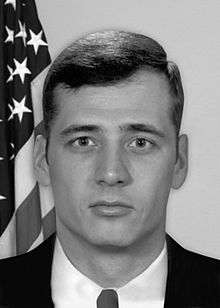Leonard W. Hatton Jr.
Leonard William Hatton Jr. (August 16, 1956 – September 11, 2001) was an American special agent of the Federal Bureau of Investigation (FBI). He was killed in the September 11 terrorist attacks on the World Trade Center in New York City when he entered one of the towers to help evacuate the occupants and stayed when the towers collapsed.
Leonard W. Hatton Jr. | |
|---|---|
 FBI Special Agent Leonard Hatton | |
| Born | August 16, 1956 |
| Died | September 11, 2001 (aged 45) New York City, U.S. |
| Cause of death | Collapse of 2 World Trade Center (September 11 attacks) |
| Resting place | New York City, U.S. |
| Monuments | National September 11 Memorial & Museum |
| Education | National University (California) |
| Occupation | Special agent |
| Employer | Federal Bureau of Investigation |
| Children | 4 |
Early life and education
Leonard W. Hatton Jr. was born in Ridgefield Park, New Jersey, to Marilyn Hatton and Leonard Hatton Sr. who was a Ridgefield Park police officer. He graduated with the class of 1975 at Ridgefield Park High School, where was a halfback on the school's football team.[1] He then attended Jersey City State College as an ROTC student, receiving his bachelor's in criminal justice. Shortly after, while in the United States Marine Corps he completed studies in forensic science at National University in San Diego. He married his high school sweetheart in 1978 with whom he had four children.[2]
Career
After six years of active duty, including a stint as a military police officer, Hatton joined the FBI in New Orleans in 1985, and worked briefly in a small Louisiana office. In 1991, he was assigned to New York City as a member of an investigative team working on a bank robbery case. Leonard Hatton's main job was an FBI specialist in explosives and evidence recovery, where he worked until his death. In addition to cracking a number of high-profile bank robbery and kidnapping cases, he investigated international terrorist attacks such as the 1993 World Trade Center bombing, the 1998 United States embassy bombings, and the 2000 USS Cole bombing. Three months before the September 11 attacks, he had testified in the trial of a follower of the Islamic terrorist group al-Qaeda.[3][4]
September 11 attacks
On the morning of September 11, 2001, Hatton was on his way to work when he saw the North Tower of the World Trade Center on fire after being struck by a jet airliner at 8:46 a.m.[3] According to eyewitness accounts, he turned back to help. On his own initiative, he responded directly to the North Tower, where he assumed a position on the roof of the Marriott Hotel. From his vantage point, he radioed his squad from atop the hotel and reported that civilians were jumping from the North Tower. He radioed again at 9:03 a.m., when a second airliner had struck the South Tower.[3] Because of falling debris, he moved from the roof and joined with New York City Fire Department (FDNY) firefighters in evacuating the civilians trapped within the South Tower.[4][5] One civilian survivor told investigators that Hatton guided him to safety and then went back into the South Tower. Asking where Hatton was going, his last response was "back into the building". Hatton continued to stay in the South Tower to help evacuate the civilians in the building when it collapsed at 9:59 a.m., killing him, along with many others inside the South Tower.
Legacy
At the National 9/11 Memorial, Hatton is memorialized at the South Pool, on Panel S-26. In 2002, the Leonard W. Hatton Memorial Golf Classic was established in Colts Neck Township, New Jersey in dedication to his memory and has held an annual golf memorial since. All proceeds are donated to the Burchette, Conners, Ellington, Hereford, Lynch Memorial College Scholarship Fund. The Fund, a 501(c)(3) organization, provides college scholarships to the children of deceased FBI Special Agents. As of June 15, 2015, the Hatton Memorial Golf Classic has raised more than $373,200 for the Fund.[6]
References
- Calderone, Joe; and Zambito, Thomas. "Farewell To FBI Bomb Expert And Father of 4", New York Daily News, October 1, 2001. Accessed November 15, 2017. "Son of a cop, Hatton starred as halfback on the Ridgefield Park football team, married his high school sweetheart and took the only job he'd ever wanted, as an agent with the FBI. His work took him to New Orleans for years, but, after being assigned to the Joint Bank Robbery Task Force in New York, he returned to Ridgefield Park.... On Saturday, as strains of an Elton John song filtered through the church, Hatton's Ridgefield Park class, members of the Class of '75, wiped away tears."
- http://myhero.com/hero.asp?hero=L_Hatton_cvhs_US_2015_ul LIFESAVER HERO: LEONARD HATTON
- "'Extraordinary' work of unsung heroes". The Washington Times. July 25, 2008.
- "Leonard W. Hatton Jr., Ridgefield Park". North Jersey.com. August 15, 2011.
- Leonard W. Hatton Archived 2016-03-04 at the Wayback Machine
- "Leonard W. Hatton Memorial Golf Classic". Retrieved 11 September 2016.